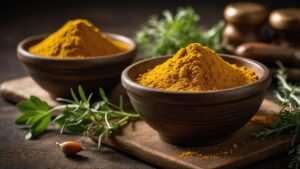Strengthening your immune system is the best defense against cold and flu viruses. While a balanced diet and a healthy lifestyle are essential, incorporating immune-boosting herbs into your routine can give you an extra layer of protection. These natural herbs have been used for centuries to fight off infections, support overall immunity, and speed up recovery when illness strikes.

This article explores some of the most effective immune-boosting herbs, how they work, and how you can easily incorporate them into your daily routine to stay healthy year-round. From elderberry to echinacea, these herbs offer powerful, natural protection against cold and flu.
The Power of Immune-Boosting Herbs
Herbs have long been valued for their medicinal properties, and many are rich in antioxidants, vitamins, and compounds that help strengthen the immune system. By incorporating these herbs into your diet, you can help your body fight off viruses and infections more efficiently.
Why Use Immune-Boosting Herbs?
- Natural Defense: These herbs offer a natural way to boost your body’s immune response without relying on synthetic medications.
- Rich in Antioxidants: Many herbs are packed with antioxidants, which protect cells from damage and improve immune function.
- Anti-Viral and Anti-Bacterial: Some herbs have natural properties that directly combat viruses and bacteria, offering extra protection during flu season.
1. Elderberry: The Immune System Supercharger
Elderberry is one of the most popular and powerful herbs for immune support, particularly in preventing and treating colds and flu. This dark berry is packed with antioxidants and vitamins, particularly vitamin C, which is known to boost the immune system. Elderberry is especially effective against respiratory viruses, as it has been shown to reduce the duration and severity of symptoms.
Benefits of Elderberry:
- Rich in Antioxidants: Elderberries are high in flavonoids, which help protect the immune system from oxidative stress.
- Antiviral Properties: Elderberry has been found to inhibit the replication of several strains of influenza, reducing the severity of symptoms.
- Shortens Cold and Flu Duration: Studies have shown that elderberry extract can reduce the duration of colds and flu by several days.
How to Use Elderberry:
- Elderberry Syrup: One of the most popular ways to consume elderberry is in syrup form. You can either purchase elderberry syrup or make your own by simmering dried elderberries with water, honey, and spices.
- Elderberry Tea: You can also enjoy elderberry as a tea by steeping dried elderberries in hot water for 10-15 minutes.
2. Echinacea: Your Go-To Cold Prevention Herb
Echinacea is another powerful herb that has been traditionally used to prevent colds and flu. It works by increasing the number of white blood cells, which are essential for fighting infections. Echinacea is most effective when taken at the first signs of illness, helping to shorten the duration and lessen the severity of symptoms.
Benefits of Echinacea:
- Boosts White Blood Cell Production: Echinacea stimulates the production of white blood cells, which play a critical role in fighting infections.
- Reduces Cold Duration: Taking echinacea early in the onset of cold symptoms can reduce the duration of illness by up to 50%.
- Anti-Inflammatory Properties: Echinacea also has anti-inflammatory effects, which help soothe sore throats and reduce sinus congestion.

How to Use Echinacea:
- Echinacea Tea: Brew echinacea root or leaves into a tea to drink during cold and flu season for added immune support.
- Echinacea Tincture: You can also take echinacea in tincture form, adding a few drops to water or juice.
3. Astragalus: Strengthening Long-Term Immunity
Astragalus is an adaptogenic herb that helps strengthen the immune system over time. Unlike echinacea, which is used at the onset of illness, astragalus is most effective when taken regularly to build long-term immunity. It has been used in traditional Chinese medicine for centuries to protect against respiratory infections and support overall immune health.
Benefits of Astragalus:
- Enhances Immune Function: Astragalus stimulates the production of immune cells and increases the body’s ability to fight off viruses.
- Protects Against Respiratory Infections: Regular use of astragalus can help reduce the frequency of colds and flu by strengthening the respiratory system.
- Adaptogen Properties: As an adaptogen, astragalus helps the body cope with stress, which is known to weaken the immune system.
How to Use Astragalus:
- Astragalus Tea: Simmer dried astragalus root in water to make a tea that can be consumed daily for long-term immune support.
- Astragalus Capsules: You can also take astragalus in capsule form for a more convenient option.
4. Garlic: The Antimicrobial Powerhouse
Garlic is not only a flavorful addition to your meals but also one of the most potent natural antibiotics available. It has powerful antimicrobial and antiviral properties, making it an excellent herb for preventing colds and flu. Garlic contains a compound called allicin, which is responsible for its immune-boosting effects.
Benefits of Garlic:
- Natural Antiviral: Garlic has been shown to combat viruses, including those that cause the common cold and flu.
- Antimicrobial Properties: Garlic’s antibacterial properties help fight off bacterial infections that may accompany colds and flu.
- Boosts Immune Function: Garlic enhances the body’s immune response, helping it fight off infections more efficiently.
How to Use Garlic:
- Raw Garlic: Eating raw garlic is the most effective way to get its immune-boosting benefits. Try adding minced raw garlic to salads, sauces, or toast.
- Garlic Supplements: If you can’t tolerate the strong taste of raw garlic, you can take garlic supplements in capsule form.
5. Ginger: The Warming Immune Booster
Ginger is another powerful herb with immune-boosting properties, particularly in preventing and treating cold and flu symptoms. It has anti-inflammatory and antioxidant effects that help strengthen the immune system. Ginger also helps to soothe sore throats, reduce inflammation, and clear nasal congestion.
Benefits of Ginger:
- Anti-Inflammatory: Ginger reduces inflammation in the body, helping to relieve sore throats and sinus congestion.
- Antioxidant Properties: Ginger is rich in antioxidants, which protect the body from oxidative stress and improve immune function.
- Relieves Cold Symptoms: Ginger’s warming effects help break up mucus and improve circulation, making it easier to recover from colds.
How to Use Ginger:
- Ginger Tea: Steep fresh ginger slices in hot water to make a warming tea that helps soothe cold symptoms and boost immunity.
- Ginger in Cooking: You can also add fresh or dried ginger to your meals, soups, and smoothies for an immune-boosting kick.
6. Turmeric: The Anti-Inflammatory Hero
Turmeric, a vibrant yellow spice commonly used in curry dishes, is a potent anti-inflammatory herb that supports immune health. Its active compound, curcumin, has been extensively studied for its ability to reduce inflammation and enhance immune function. Turmeric is particularly helpful for preventing respiratory infections and supporting overall immune resilience.
Benefits of Turmeric:
- Reduces Inflammation: Curcumin in turmeric has powerful anti-inflammatory effects that help reduce the severity of cold and flu symptoms.
- Boosts Immune Function: Turmeric enhances the body’s immune response and helps protect against infections.
- Rich in Antioxidants: Turmeric’s antioxidant properties help fight off free radicals and protect cells from damage.
How to Use Turmeric:
- Golden Milk: Make a warming beverage by mixing turmeric with milk (or a milk alternative), honey, and a pinch of black pepper for enhanced absorption.
- Turmeric Capsules: If you prefer a more concentrated form, turmeric capsules are widely available as a supplement.
How to Incorporate Immune-Boosting Herbs Into Your Routine
Incorporating immune-boosting herbs into your daily routine can be simple and enjoyable. Here are a few ways to make these herbs a regular part of your life:
- Herbal Teas: Drinking herbal teas made from immune-boosting herbs like elderberry, echinacea, or ginger is a relaxing way to protect your health.
- Supplements and Tinctures: For convenience, many of these herbs are available in supplement or tincture form, making it easy to get their benefits without having to prepare them.
- Incorporate Into Meals: Many immune-boosting herbs like garlic, ginger, and turmeric can be easily added to your cooking, giving your meals both flavor and health benefits.
Conclusion
Using natural herbs to boost your immune system is a powerful and effective way to stay healthy during cold and flu season. Whether you choose elderberry for its antiviral properties, echinacea to fend off colds, or garlic to fight off infections, these herbs offer a safe and natural way to support your immune health. By incorporating these herbs into your daily routine, you can strengthen your immune system, reduce the frequency of illnesses, and recover faster when cold and flu do strike.









